Kategorie: ‘Auszeichnungen’
Max Lemme receives RWTH Fellow award
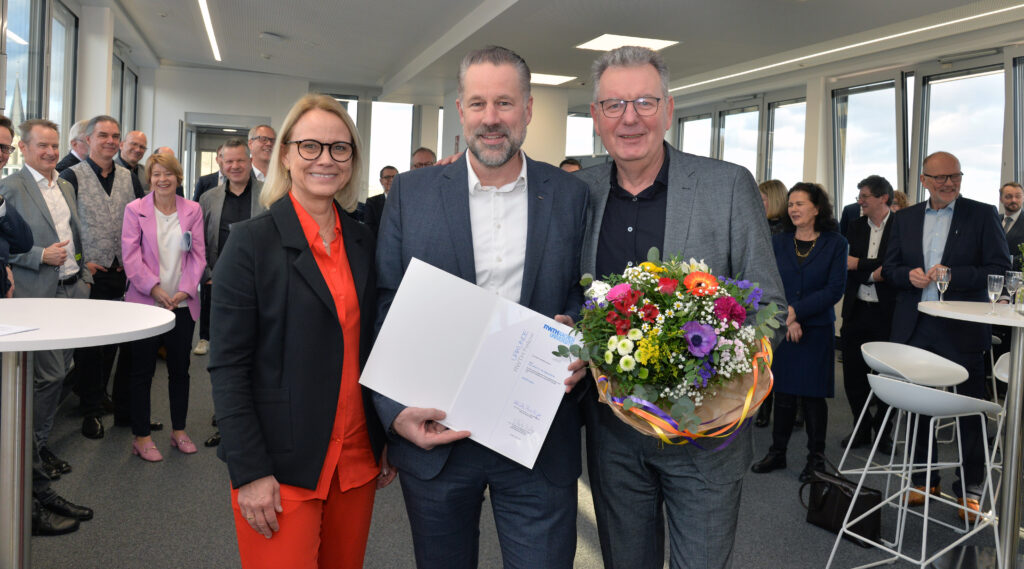
Vice Rector Sabine Brück (left) and Vice Rector Matthias Wessling (right) honour Professor Max Lemme as RWTH Fellow. Photo: Andreas Schmitter
Professor Max Lemme, head of the Department of Electronic Devices, and Professor Harald Müller, head of the Department of Medieval History, are new RWTH Fellows. With this title, the RWTH Aachen University honours professors who have distinguished themselves in research and have rendered outstanding services to the RWTH Aachen University.
Professor Max Lemme is a highly respected expert in the field of devices based on 2D materials and enjoys international recognition. One of his major achievements is a study on a graphene-based field-effect transistor, which has been cited 1353 times to date. He has successfully obtained research funding, including an ERC Starting Grant in 2012 and a Proof of Concept Grant from the European Research Council in 2018. He was also awarded a prestigious Heisenberg Professorship by the German Research Foundation in 2012. Max Lemme was instrumental in the establishment of the NeuroSys Cluster of Excellence and is its spokesperson. He is also an expert reviewer for the European Community and regularly participates in major conferences in the field of semiconductor devices, including IEDM, ESSDERC, DRC and ULIS.
The award he holds was introduced as part of the Excellence Initiative in 2013 and is based on nominations from the Deans of the Faculties.
Click here to go to the website of the Chair of Electronic Components.
Dr Jan Moritz Joseph admitted to the “Junges Kolleg”
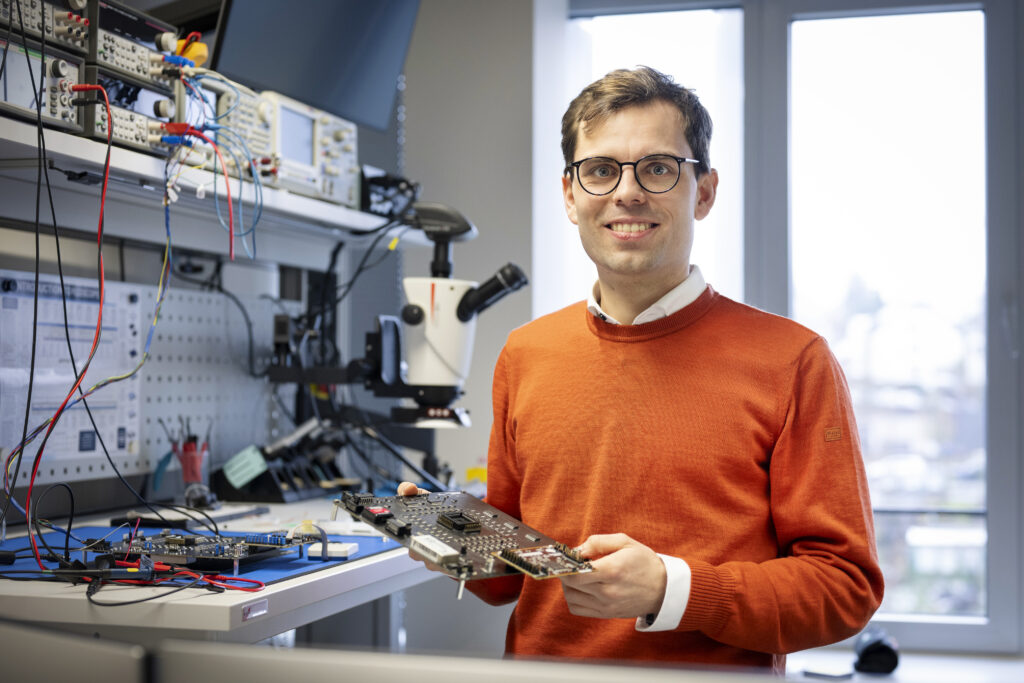
© Nordrhein-Westfälische Akademie der Wissenschaften und der Künste | Bettina Engel-Albustin 2022 (NRW AWK| Engel-Albustin)
The dedicated researcher Dr Jan Moritz Joseph from the Institute for Communication Technologies and Embedded Systems at RWTH Aachen University has secured a coveted place in the prestigious “Junges Kolleg” of the North Rhine-Westphalian Academy of Sciences, Humanities and the Arts. This admission is considered one of the highest academic honours that can be achieved in North Rhine-Westphalia (NRW). Congratulations!
In addition to Dr Jan Moritz Joseph, Junior Professor Lisa Spantig, Dr Maike Dohrn and Dr Julia Exarchos – all from RWTH Aachen University – were also accepted into the Young Academy of the North Rhine-Westphalian Academy of Sciences, Humanities and the Arts. The Academy has accepted a total of 19 new scholarship holders into its Young Academy. The RWTH has the most new members. Admission to the “Junges Kolleg” is one of the most important honours for young academics in North Rhine-Westphalia. They receive an annual grant of 10,000 euros and take part in academy events.
Dr Jan Moritz Joseph from the Institute for Communication Technologies and Embedded Systems (ICE) at RWTH Aachen University is researching energy-efficient methods for the design and use of AI in embedded systems. The focus is on neuromorphic hardware. Traditionally, AI is executed on systems in which computing and memory units are separate, which limits performance. Neuromorphic systems combine both units in a new component and are therefore more energy-efficient. Dr Jan Moritz Joseph and his team are designing an integrated system in which hardware and software are developed together. He and his team received the RWTH’s Innovation Award 2022 for the best transfer project for their hardware and software development systems. He studied computer science and medical technology and received his doctorate in electrical engineering and information technology in 2019.
The academy has been supporting young talent in NRW with the “Junges Kolleg” since 2006 and now has around 170 active, associated and former scholarship holders. In addition to a doctorate, membership requires outstanding academic achievements at a university or research institution in North Rhine-Westphalia. Members must not be older than 36 at the time of admission. RWTH Aachen University currently has seven researchers in the “Junges Kolleg”.
We at the Faculty of Electrical Engineering and Information Technology would like to congratulate Dr Jan Moritz Joseph on joining the Academy.
Prof Leonhardt elected to the German Academy of Science and Engineering
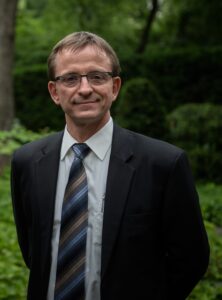
© Andreas Endermann
The German Academy of Science and Engineering, a prestigious private not-for-profit scientific academy, has recently welcomed 39 new members. Among them is Professor Leonhardt, Chair of Medical Informatics. This expansion of the Academy’s expertise strengthens its ability to provide valuable science-based advice to policymakers and society as a whole. Congratulations!
Established in 2002, the German Academy of Science and Engineering plays a crucial role in advising policymakers on science and technology policy. It operates under the umbrella term acatech, a combination of ‘academy’ and ‘technology’, and has a significant impact beyond national borders, representing the interests of German technological sciences at both national and international levels.
In June 2017, Federal President Frank-Walter Steinmeier became the patron of the German Academy of Science and Engineering, highlighting the institution’s dedication to promoting scientific and technological excellence.
We, at the Faculty of Electrical Engineering and Information Technology, are proud to congratulate Prof. Steffen Leonhardt on his election to the Academy.
Otto Junker Prize Award 2023
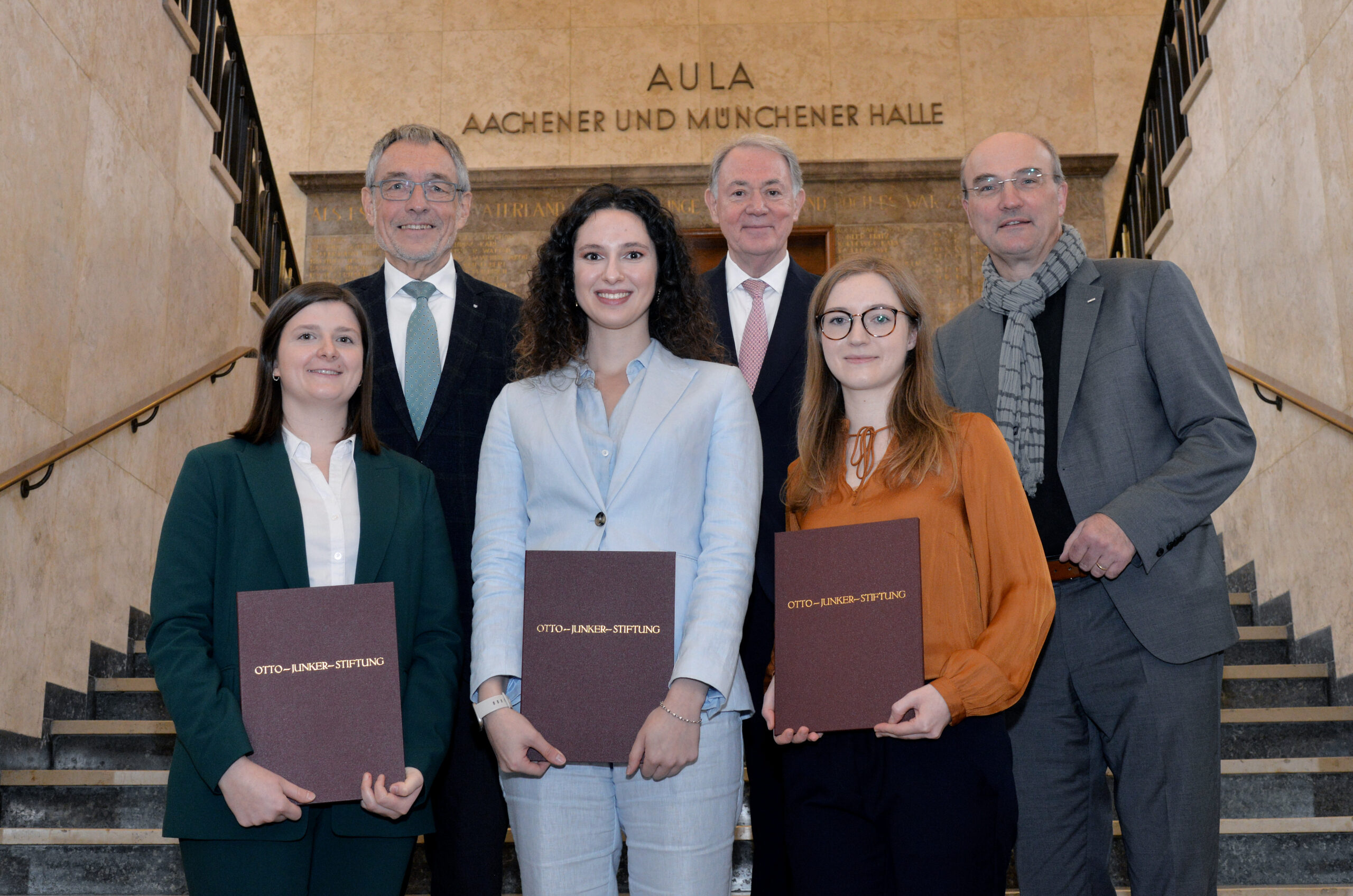
In front, from left: Prizewinners Lina Fischer, Alba Clemente Sánchez and Kathrina Theisen. At the back, from left: Wolfgang Bleck, Udo von Berg and Ulrich Rüdiger.
Lina Fischer, a doctoral student at the Chair of Transmission Networks and Energy Economics at the IAEW, is one of three winners of the Otto Junker Prize for excellent academic performance.
The Otto Junker Prizes were recently awarded to three impressive graduates of RWTH Aachen University in a festive ceremony. Lina Fischer, Alba Clemente Sánchez and Kathrina Theisen were honored for their outstanding academic achievements.
The awards, named after the founder of the Otto Junker Foundation, Dr. Otto Junker, are presented annually to exceptional graduates of the Faculty of Electrical Engineering and Information Technology and the Materials Science and Engineering Group in the Faculty of Georesources and Materials Engineering. The foundation, established in 1970, is dedicated to promoting young scientists and supports numerous individual projects.
The award ceremony took place during a festive event at which Udo vom Berg, Chairman of the Otto Junker Foundation, and RWTH Rector Ulrich Rüdiger personally presented the awards. Professor emeritus Wolfgang Bleck, Chairman of the Foundation’s Scientific Advisory Board, joined in the congratulations.
Lina Fischer, born in Bruchsal in 1998, enrolled for a Bachelor’s degree in Industrial Engineering and Management with a specialization in Electrical Power Engineering at RWTH Aachen University after graduating from high school. She completed her Master’s degree with a thesis on “The impact of flexible consumers on market pricing in a renewable electricity supply system” at the Chair of Transmission Networks and Energy Economics under the supervision of Professor Albert Moser. Since the beginning of 2023, Fischer has been working on his doctorate at the RWTH Institute for Electrical Systems and Grids, Digitization and Energy Economics.
Alba Clemente Sánchez impressed the jury with her master’s thesis on the development of a digital twin for the optimization and online control of a continuous steel casting process. Kathrina Theisen was honored for her master’s thesis entitled: “Design investigations for glass tank simulation”.
The impressive achievements of these three graduates not only underline their individual excellence, but also honor RWTH Aachen University as an educational institution for brilliant personalities. We congratulate Lina Fischer, Alba Clemente Sánchez and Kathrina Theisen on this well-deserved recognition and wish them continued success on their promising career paths.
“Accure” and “Cylib” win the NRW Innovation Award 2023
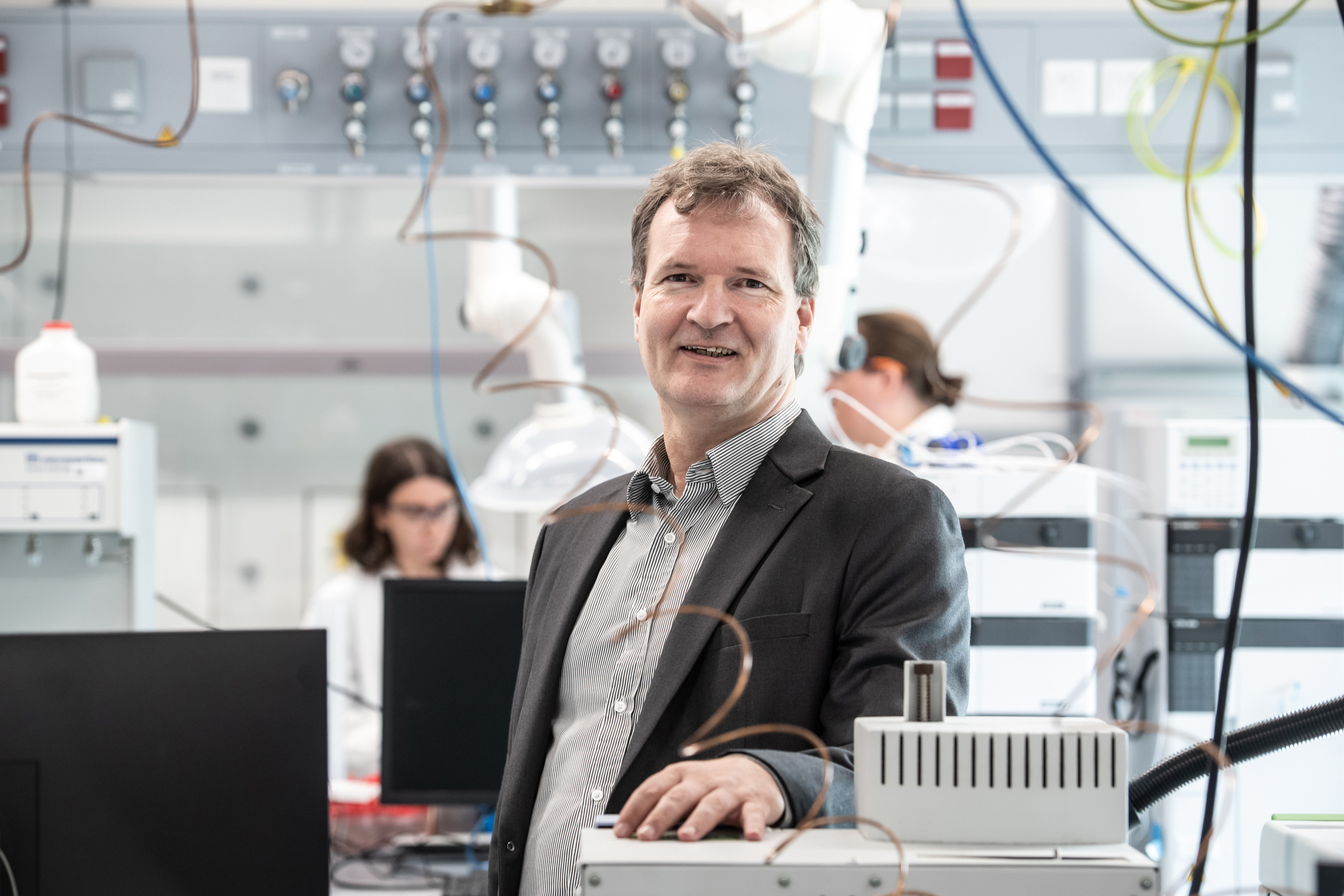
Professor Dirk Uwe Sauer © Heike Lachmann
Innovative technologies and sustainable solutions in focus: RWTH start-ups make their mark in the fight against climate change.
The NRW 2023 Innovation Award has put the spotlight on two outstanding RWTH spin-offs: “Accure” and “Cylib”. These two start-ups not only have their roots at RWTH Aachen University, but also share a common mission – to fight rising temperatures and the associated challenges of climate change.
“Accure” was founded in 2020 by Dr. Kai-Philipp Kairies, Dr. Georg Angenendt and Dr. Johannes Palmerist and emerged from the Chair of Electrochemical Energy Conversion and Storage Systems Technology headed by Professor Dirk Uwe Sauer. Dirk Uwe Sauer and co-founder Kai-Philipp Kairies accepted the NRW 2023 Innovation Award in the “innovation2business” category in Düsseldorf. This award recognizes individuals who have developed successful business models from outstanding ideas.
The start-up specializes in monitoring the performance, safety and lifetime of batteries based on big data and the use of artificial intelligence (AI). Such an innovative approach is crucial for the introduction of sustainable energy storage solutions. Dirk Uwe Sauer emphasizes the need to transfer scientific findings to the business world in order to have a positive impact on society. This is exactly what “Accure” has successfully achieved.
“This honor means a lot to us,” says Sauer, “because we are standing up for changing things with our research.”
The award in the “innovation2business” category comes with prize money of 50,000 euros, which will be earmarked for further research purposes.
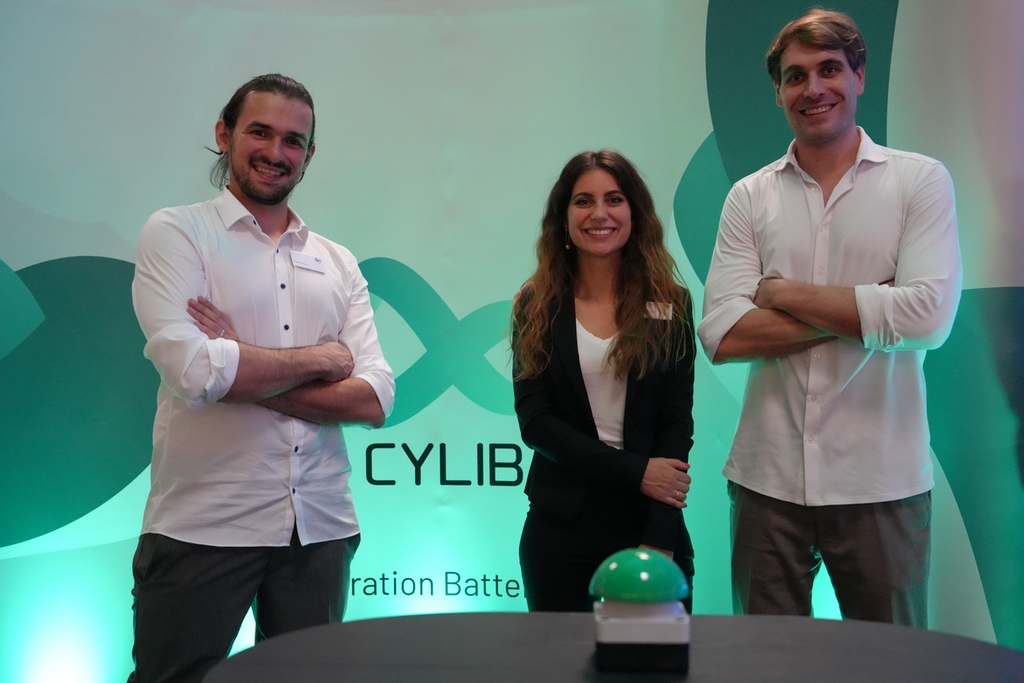
The founders of “Cylib”, Paul Sabarny, Lilian Schwich, Dr. Gideon Schwich from left © Anna Wawra
The evening was even more exciting than for “Accure” for Lilian Schwich, one of the three founders of “Cylib”. While “Accure” had already been determined as the award winner before the event, Lilian Schwich had to compete against two other nominees in the “innovation4transformation” category on Monday evening.
The start-up, which she founded together with her husband Dr. Gideon Schwich and Paul Sabarny, has spent years developing a process at RWTH Aachen University to recycle all the components of a lithium-ion battery. The goal is to recover all components and thus close the gap in the circular economy. This approach is not only more effective, but also more environmentally friendly compared to the current state of the art.
“The award is also a recognition for the long hard time of research,” said Lilian Schwich, “with research we spent many hours, days, weeks, weekends.”
The audience award “innovation4transformation” is given to personalities whose innovative products, solutions or business models contribute in an outstanding way to solving transformation challenges. This category is endowed with 25,000 euros and recognizes the contribution of “Cylib” to the circular economy and environmental protection.
Both awards underscore the important role of RWTH spin-offs in developing innovative solutions to the pressing challenges of the 21st century, particularly in the fight against climate change. With their groundbreaking technologies and sustainable approaches, they are pioneers on the path to a more environmentally friendly and sustainable society.
For more insights, watch the interview and video with Professor Dirk Uwe Sauer and the interview with Lilian Schwich.
Biosensors for health: Team AixSense receives multiple awards at Sensus 2023
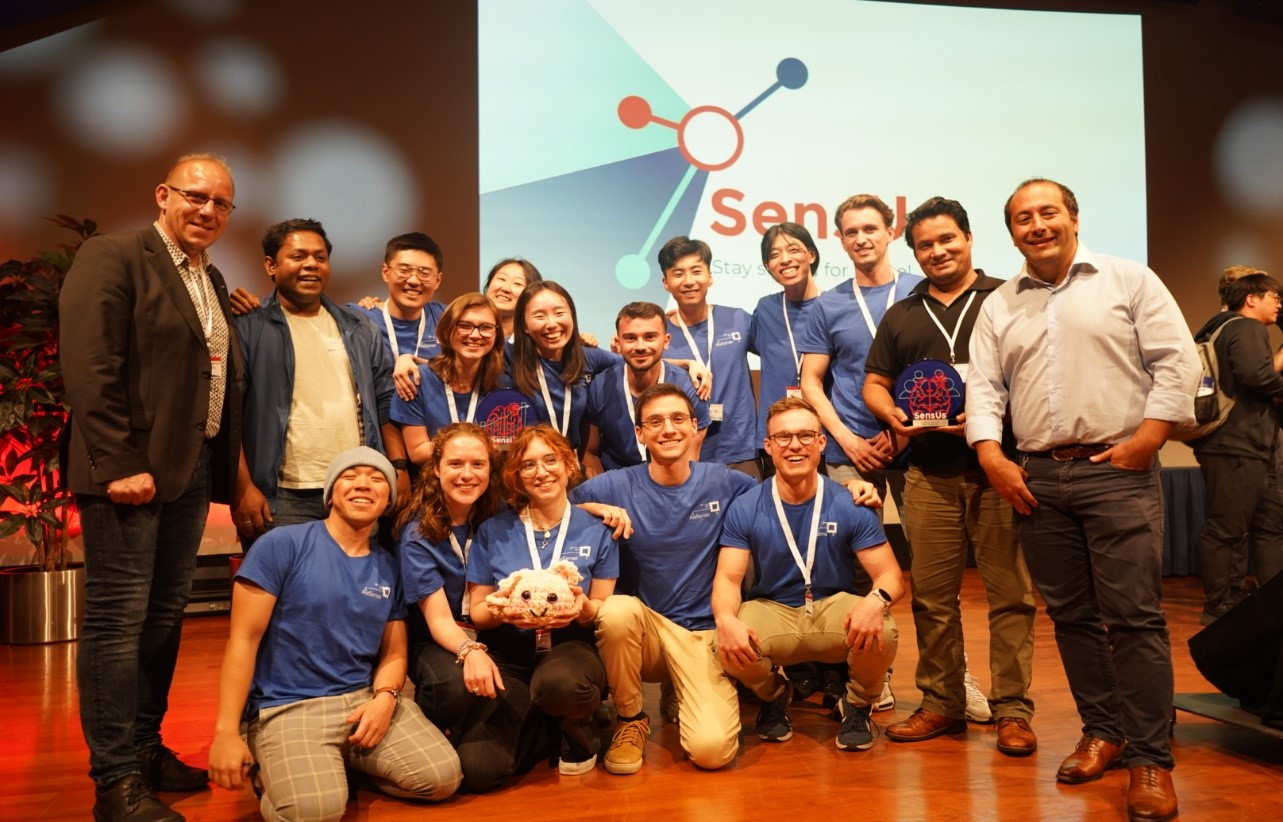
© Erdenebat Battseren
With the development of an innovative blood-based biosensor for the detection of traumatic brain injuries, the AixSense team stood out in an impressive field of competitors.
Once again this year, 15 student teams from all over the world took up the challenge of creating a biomarker prototype for detection and thus advancing sensor technology for improved healthcare.
RWTH Aachen’s AixSense team excelled in the competition, which was hosted by Eindhoven University. Their biosensor chip, which was manufactured with extreme precision in the cleanroom laboratory, caught the attention and recognition of the jury. This led to an award of the coveted Translation Potential prize. In addition, AixSense secured the Public Inspire Award by cleverly using social media platforms and collecting 1000 votes within 24 hours. The Aachen team’s outstanding engagement culminated in a first place in the vlog competition, which earned them the prestigious SensUs Gold Medal.

© SensUs
After the previous topics on antibiotic resistance, rheumatism, epilepsy, influenza A and sepsis, the teams from universities around the world explored a new pathology: Traumatic Brain Injury, defined as sudden external injury resulting in brain damage. Every year, around 27 to 69 million people worldwide are affected by this. The challenge here is the range of injury severity, which makes accurate detection all the more relevant.
„We are honored to have participated in such competition representing the university on an international level. We are also proud that all our team efforts were awarded with several prizes for RWTH Aachen University,”concludes the team leader of AixSense.
The Institute of Materials in Electrical Engineering at RWTH Aachen University deserves special credit for putting together this exceptional team, led by Dr Vivek Pachauri and Professor Sven Ingebrandt, with Dibyendu Khan and Aidin Nikookhesal supervising.
Check out the SensUs page for more up-to-date information on this year’s competition.
IntSpire – the Prize for Internationalization
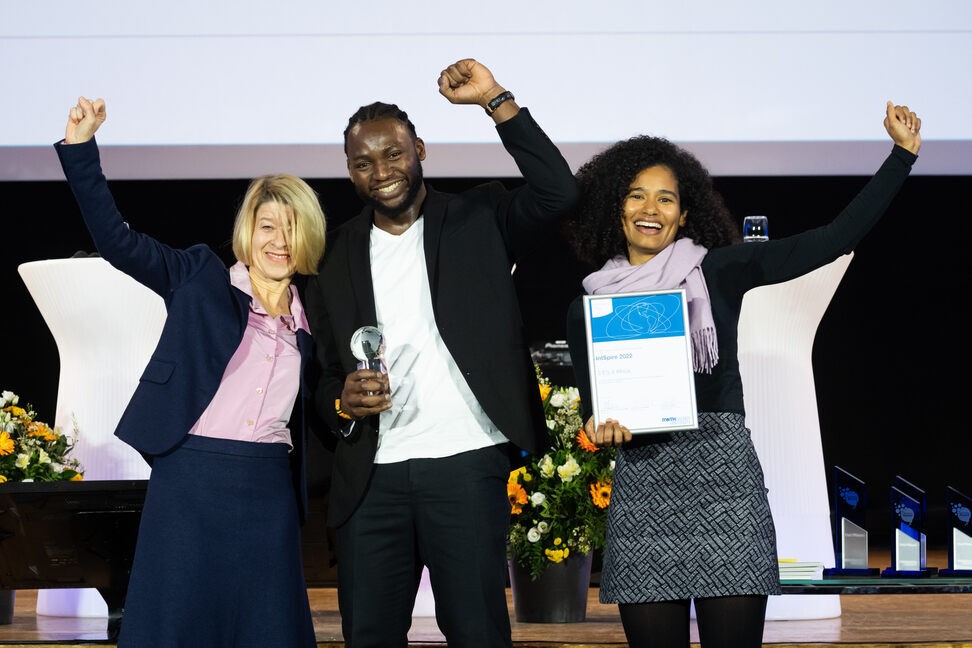
Award ceremony IntSpire 2022 © Heike Lachmann
Creativity, diversity and internationality are the building blocks of excellent solutions to the global challenges of our time.
In order to make visible and honor people and institutions within RWTH Aachen University who make an exceptional contribution to the internationalization of the university, the “IntSpire” prize was established in 2020 by the International Office and the Prorector for International Affairs and has since been awarded annually in a festive setting and with prize money of 500 euros.
Internationalization permeates all levels of our university and changes them in a far-reaching and sustainable way. It opens up the boundaries of our own horizons and is crucial for education, teaching, research and the future of our society.
In order to promote and advance the diverse facets of living internationalization at RWTH, many individuals and institutions are committed beyond the normal scope.
Against this backdrop, the IntSpire team is calling for suggestions for honors from among RWTH members. These can be individuals such as employees and students, but also organizations, facilities and institutes that are particularly committed to the internationalization of RWTH. During the proposal phase from September 1 to October 15, a proposal form can be filled out and submitted by e-mail. A jury consisting of representatives of the university management, the professorate, the International Office, the Staff Council for Technology and Administration, the Staff Council for Scientific Employees and the students of RWTH Aachen University will select an award-winning person or institution from the proposals received and substantiated in writing.
For more information and the proposal form, please visit the official RWTH page.
German Study Award: Silver goes to Dominik Šišejković
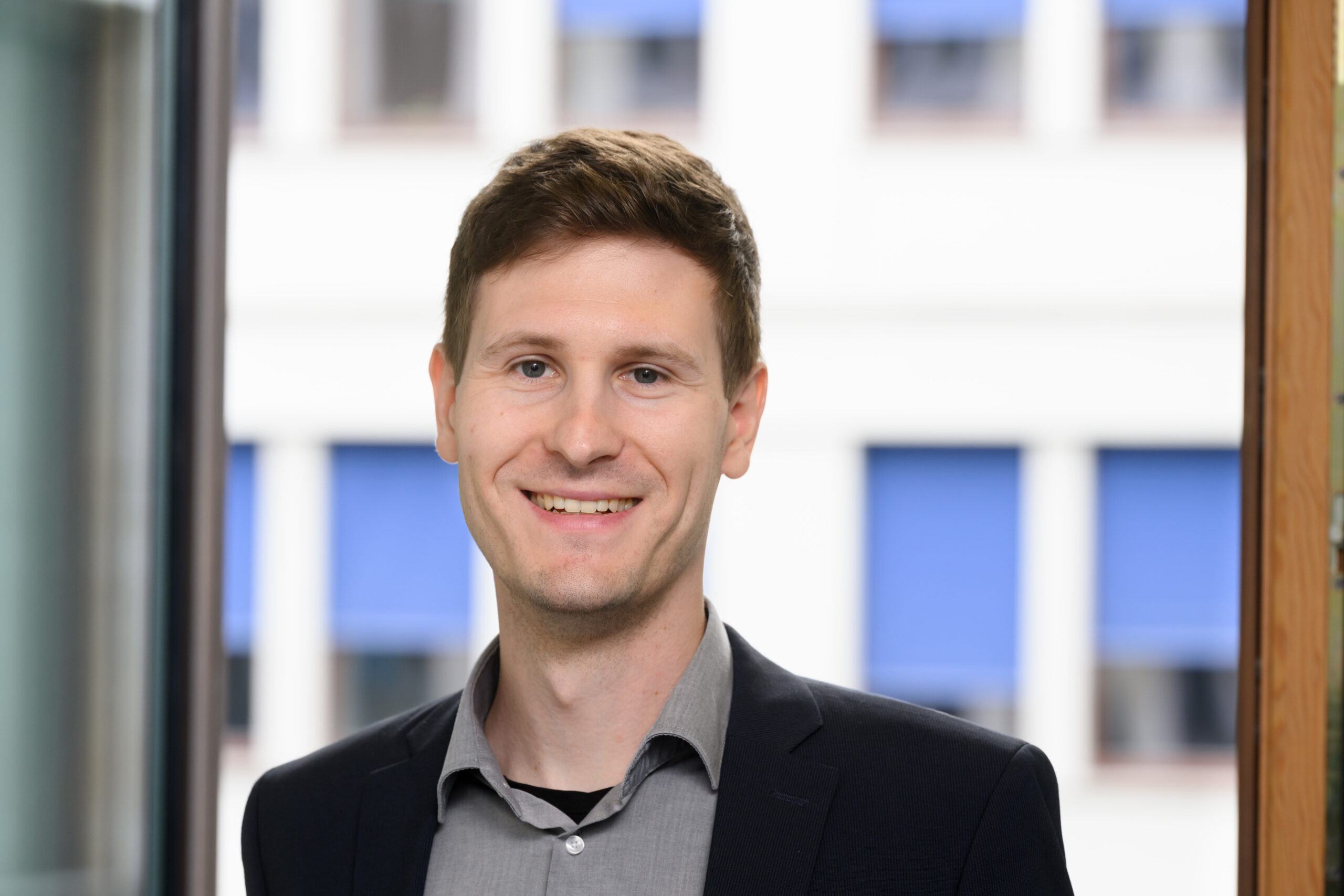
Award winner Dominik Sisejkovic ©David Ausserhofer
His excellent dissertation, Development of trustworthy microelectronics – from theory to practice, will be honored by the Körber Foundation with the German Study Award 2023 on November 27 at the German Parliamentary Society in Berlin. Dominik Šišejković will receive the second prize in the Natural and Technical Sciences section from Bundestag President Bärbel Bas.
The focus of his doctoral thesis is the question of how hardware can be protected against decentralized modifications. This is all because hardware Trojans represent one of the greatest security threats of the modern age. Such a carefully designed modification allows attackers to gain access to critical infrastructure, extract secret information or even shut down systems at the worst possible moment.
“In this work, we take a step-by-step approach to understanding logic encryption, from its basic mechanics to software implementation to an in-depth analysis of its security properties in the age of machine learning,” explains Dominik Šišejković, a PhD student at RWTH Aachen University in the Department of Electrical Engineering.
One possible solution is hidden in logic encryption, a leading technique for securing hardware. The results were bundled into an industry-proven encryption method that provides a secure way to protect hardware.
The German Study Award is one of the most highly endowed prizes for young scientists in Germany. Each year, it honors outstanding young scientists from all disciplines. The Körber Foundation awards prizes totaling more than 100,000 euros for excellent dissertations of particular social significance.
The Reichart Prize 2023 goes to Dr.-Ing. Weihan Li
Prof. Frank Hellwig and Prof. Peter Scharff award Dr. Weihan Li the Reichart Prize 2023 © Mathias Brösicke
A remarkable contribution to application-oriented science was honored when Dr.-Ing. Weihan Li received the coveted Reichart Prize on June 24, 2023. The junior research group leader at the Center for Ageing, Reliability and Lifetime Prediction for Electrochemical and Power Electronics Systems (CARL) at RWTH Aachen University was recognized for his pioneering work in digitizing battery use with a digital twin. This innovative approach aims to provide greater clarity on battery aging processes, safety and reliability.
Named after Christian Reichart, a versatile Erfurt resident, the prize awarded annually highlights outstanding graduate work in various scientific fields. The cooperation between the state capital of Erfurt, the University of Erfurt and the University of Applied Sciences in Erfurt ensures that this prize promotes talented young scientists whose work has a clear link to applicability. In doing so, it honors the legacy and vision of Christian Reichart, who already distinguished himself in the 18th century as a pioneer of interdisciplinary research and non-profit applications. The award committee, consisting of representatives from these institutions, selects the winners and acknowledges promising research approaches with prize money of 2,000 euros and strengthens interdisciplinary exchange. This award underlines the importance of using scientific findings for the benefit of society and building bridges between different disciplines to create practical solutions to current challenges.
More about the Reichert Prize can be found on the website of the Academy of Erfurt.
Excellent placement in global university ranking

© Kurt Beyer
In electrical engineering, RWTH Aachen is one of the three best German universities. This is the result of the internationally highly regarded QS Ranking by Subjects of the British information service provider Quacquarelli Symonds. Presented in its latest version, the subject ranking is based on various criteria that are weighted according to subject. An online reputation survey among university graduates and employers accounts for between 40 and 100 percent of the total points and is considered the most important indicator. Citations, which scientific papers from universities receive on average, account for up to 60 percent. For some engineering and natural science subjects, international research networks are also taken into account.
The Aachen University of Excellence was able to place itself on the winner’s podium in many subjects throughout Germany and is also convincing in an international comparison. In ten subjects, it placed among the 100 best worldwide. RWTH did particularly well in the subjects of mining engineering with 15th place and mechanical engineering with 19th place.
For more information: www.topuniversities.com



